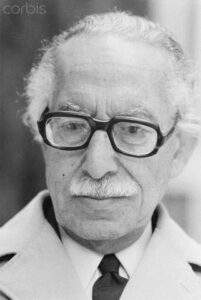Language of Diary of a Country Prosecutor
Language of Diary of a Country Prosecutor
Language of Diary of a Country Prosecutor
The language of Tawfiq al-Hakim employed in the novel Yawmiyyat Naif Fil Aryaf Translated into English by Abba Eban as Diary of a Country Prosecutor is characterized by complexity in structure, use of dashes, use of abundance similes, use of abstract term and words and references. Let us substantiate his style of language as follows:
Simplicity is alien to Tawfik’s language rather he makes his language complicated by making them long and complex. For instance, we can quote the following sentences as:
“To make him still more wretched, there was this stillness which descended on the village after sunset; thereafter there was no sound except of the lowing of the oxen, the barking of the dogs, the braying of donkeys and the creaking of water wheels, pumps and hydraulic machines, apart from the sound of shots let off in the dead of night by private or official watchmen trying to frighten other people, or to keep up their own courage.”
“From early morning, right up to now, there isn’t a single field in the district- not a single sugar plantation or water- wheel or mill or hamlet or yard or canal or ground or path or country road of flaming hell- which we have not turned upside down and searched inch by inch.”
In the above-quoted sentence, the novelist has employed the preposition ‘or’ as many as nine-time including two dashes and thus the sentence has been made a complex one.
In many of his sentences, he has used at least two dashes. The dashes are seemed to be used in place of comas (,). For example, we can quote at random the following sentences:
1.“Next time I’ll have some sweets for you- I really will – chick peas, sesame, nuts, almonds, pistachio …”
2.“On the one side- money; on the other side hallowed traditions.”
Thirdly, the novelist shows his weakness in using abstract words and terms in place of concrete words. For example- most of his characters are named after abstract terms as- the prosecutor, the ma’mur, the ghafir, the effendi umdah, the qadi etc. instead of giving them proper names.
Fourthly, he has made ample use of similes throughout the novel which are characterized by native flavour. For example, the following sentences may be quoted:
1.“I rushed to my clothes, dressed with frantic speed, like a member of a fire-brigade.”
2.“Whenever he hears the horn of the Ford van blowing in the distance he follows it wheresoever it goes, like a dog follo.
3. “My fatigue flew away like an owl flying from its nest at the approach of dawn.”
4.“My assistant sat by me watching the proceedings with apathetic eyes, for languor had beguiled him as the zephyr breeze beguiles leaves on a tree.”
5.“She stood in the doorway clad in a long black robe like an ebony statue engraved with a white countenance.”
6.“This girl, as it seemed to me, had a mind like a thicket of reeds and sugar-cane, like dancing coins, lashing in the dark, whenever the reeds inclined this way or that……”
7.“Fatigue crept over my limbs and I drooped in the saddle, but the fresh morning breeze kept caressing my face with gentle strokes, like the waving of a fan in the hands of a lovely maid.”
8.“The spectacle of the young girl had a refreshing effect on me, like dewdrops on withered grass.”
9.“But cases are like cats- when you call them they refuse to come, and when you shoo them away they rub themselves a…..
10.“We saw the convalescents in their wide blue tunics avidly devouring their porridge from aluminium pots, staring at us as we passed with the chief surgeon, like monkeys in the zoo gazing at their keepers and visitors.”
Fifthly, many of Tawfiq’s sentences have turned into aphoristic (maxim-like) expressions. For example, the following expression may be quoted at random:
1.“Solution of riddle is a gift not granted to all: and the power to solve them requires accurate knowledge of motives lying concealed in the deepest recess of men’s hearts.”
2.“Court tea and court work – it’s all bitter.”
3.“True beauty and true virtue are identical.”
4.“The pen is a great boon to those like us whose destiny is solitude.”
5.“If you get between the onion and the peel, all you’ll get is a nasty smell.”
6.“Victims fail to recognize anyone.”
7.“The legal Department knows no barriers.”
Sixthly, the novelist Tawfiq al-Hakim has made much allusions and references to Islamic beliefs:
1.“I had no doubt that he could cross the Sirat on the Day of Judgment riding a camel.”
2.“For Justice is the foundation of authority, and Allah, be He exalted and magnified, hath said in His Holy Book: And if ye judge amongst men, then judge ye in righteousness. Verily the word of Allah is the truth.”
3.“There is no power or device except in Allah! Verily we are unto“We have omitted nothing in the book (The Holy Kuran).”
Thus the novelist has attained peculiarity in the use of linguistic style in his novel Yawmiyyat Naif Fil Aryaf. 0 0 0
Language of Diary of a Country Prosecutor
Read More: Theme Analysis of ‘Diary of a Country Prosecutor’
Language of Diary of a Country Prosecutor
N. B. This article entitled ‘Language of Diary of a Country Prosecutor’ originally belongs to the book ‘Tawfiq al-Hakim’s Novel ‘Yawmiyyat Naib Fil Arayaf-An Analytical Study‘ by Menonim Menonimus. Language of Diary of a Country Prosecutor
Books of Literary Criticism by M. Menonimus:
- World Short Story Criticism
- World Poetry Criticism
- World Drama Criticism
- World Novel Criticism
- World Essay Criticism
- Indian English Poetry Criticism
- Indian English Poets and Poetry Chief Features
- Emily Dickinson’s Poetry-A Thematic Study
- Walt Whitman’s Poetry-A Thematic Study
- Critical Essays on English Poetry
- Tawfiq al-Hakim’s Novel: Return of the Spirit-An Analytical Study
- Tawfiq al-Hakim’s Novel: ‘Yawmiyyat Naib Fil Arayaf’-An Analytical Study
- Analytical Studies of Some Arabic Short Stories
- A Brief History of Arabic Literature: Pre-Islamic Period …
Related Searches:
- Diary of a Country Prosecutor
- Tawfiq al-Hakim Biography
- Novels and Plays of Tawfiq al-Hakim
- Arabic Short Stories Archives
- Modern Arabic Literature











